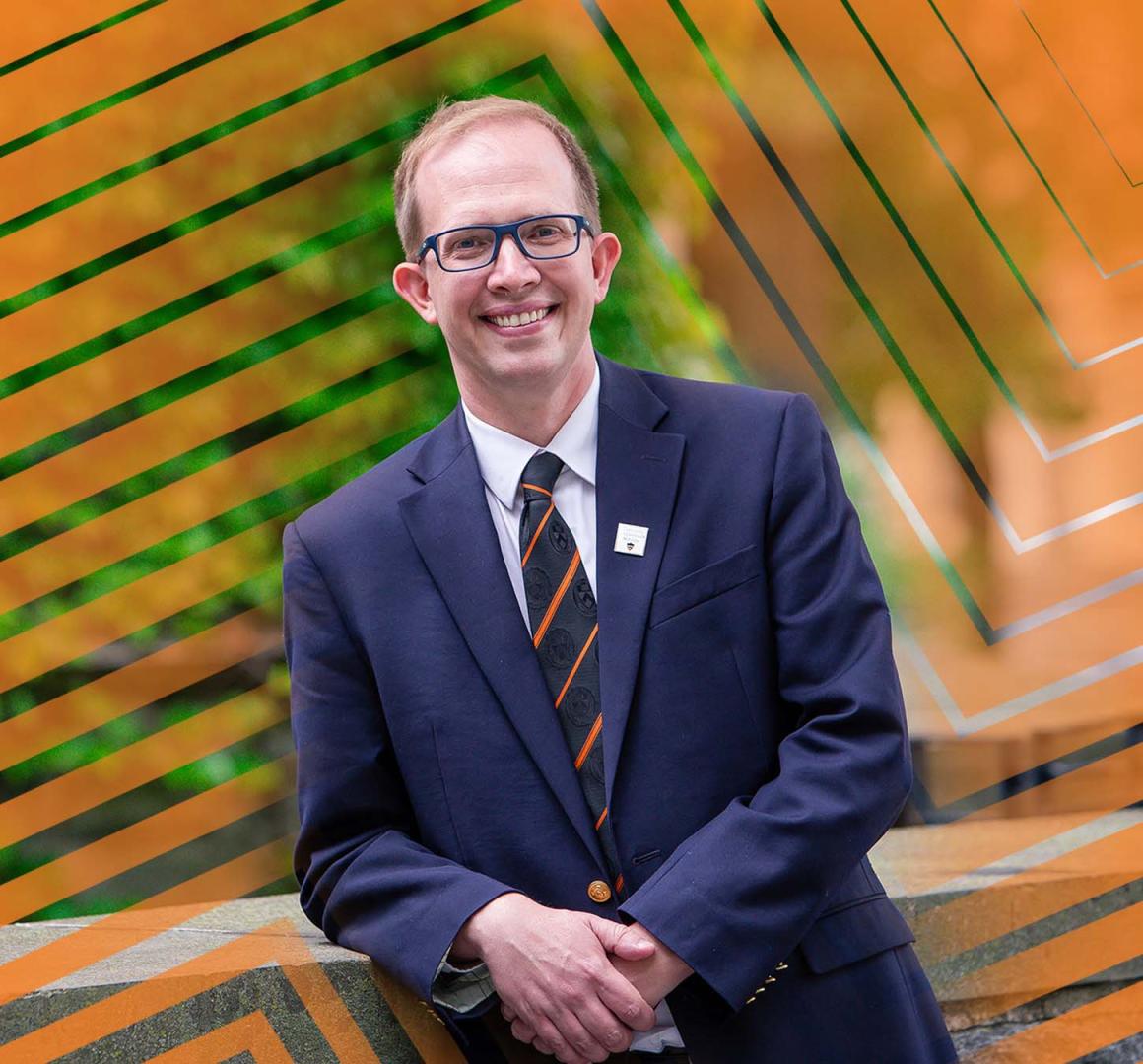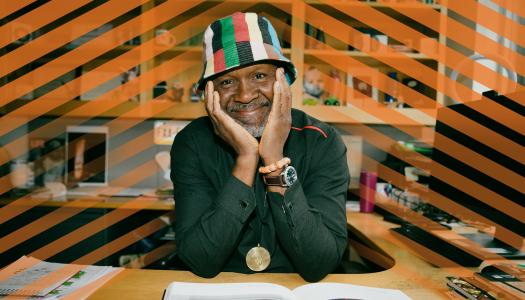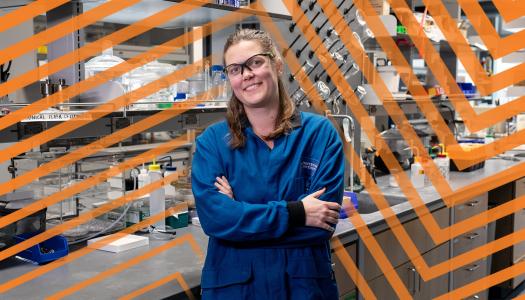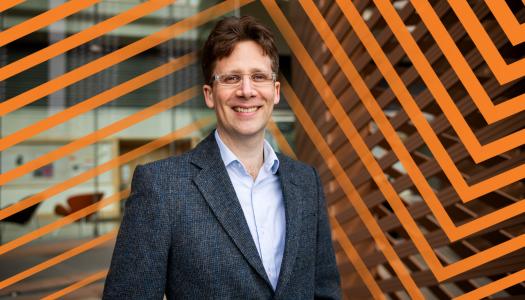Andrew Houck ’00 is making quantum leaps to unlock a multiverse of possibilities
Watch the Venture Forward video
There is an order to Andrew Houck’s office that isn’t apparent to the naked eye.
Located in the B-wing of the Engineering Quadrangle, one wall of the office is dominated by a whiteboard filled with equations. A few cardboard boxes are placed strategically to allow for a small path around the black oval table — Houck’s desk — at the center of the room. Opposite the whiteboard, a series of wall-length shelves are alternately empty or overflowing with books, award plaques, precariously stacked black binders and framed family pictures. Other features include stacks of journals and mail, a few coffee mugs, some coins, three rolls of packing tape, a couple of water bottles, a random collection of screws and screwdrivers and a box of K-cups.
From his chair behind the oval table, Houck ’00, the Anthony H.P. Lee ’79 P11 P14 Professor of Electrical and Computer Engineering and co-director of the Princeton Quantum Initiative, is talking about the state of particles in objects, and how quantum science and engineering open a multiverse of possibilities.
“What’s exciting about working in quantum is that you get to look at the world with new eyes,” he says, adding that the principles of quantum mechanics may seem otherworldly, but aren’t any weirder than gravity or any other aspect of science. “We observe the world on a length and scale where we see classical physics all the time, so they feel normal. The quantum world seems weird because we don’t get a chance to observe it very often.”
Just as in the universe of Houck’s office, it can be difficult to see the order in a quantum system because it operates under a complex and bizarre set of principles. For instance, subatomic particles can become “entangled” over long distances despite no discernable connector. This would be like if someone took one of Houck’s coins to the pond next to the Institute of Advanced Study and repeatedly flipped it while someone back in the office flipped another coin and having both come up the same every single time.
“Another principle called superposition says that an object can be in more than one state at the same time,” Houck says. “And a third principle is that measurement fundamentally changes the system and forces it to be something more real, like Schrödinger’s cat being either alive or dead when you open the box.” An example of these two principles would be like seeing that one of the water bottles lying in his office was both empty and full at the same time and then picking it up and finding it empty.
Tapping into these strange subatomic behaviors has put engineers and scientists on the verge of creating new technologies. “Quantum science has reshaped our understanding of the physical world and our fundamental understanding of the universe,” Houck says. “Over the past few decades, we’ve gone from thought experiments to actually using quantum physics to build fundamentally new kinds of technology.”
For instance, quantum computing started as a philosophical question that eventually led engineers to realize they could build an entirely new type of computer. “There are certain classes of problems that quantum computers can solve much more efficiently than regular ones,” he says. “That discovery kicked off the now 25-year effort to build them.”
Leaning back in his chair, Houck points to his MacBook. “That laptop is, in a sense, cut off from a universe that is intrinsically quantum mechanical,” he says. “But imagine what would be possible if we could build computers constrained not by what we can do right now, but only by the laws of physics as we know them?”
To that end Houck’s lab is hard at work discovering, building and engineering the fundamental building block of quantum computers: qubits, which are minuscule objects that can be manipulated to store information while still obeying quantum principles. “These qubits can be in superposition or even entangled with other qubits, making them extremely powerful,” Houck says.
The transformative potential of quantum science has led Princeton to double down on its interest in the field. In the June 2023 update to the University’s strategic framework, the board of trustees announced the establishment of a new institute for quantum science and engineering as a major priority. In 2019, the University took its first steps toward the institute by establishing the Princeton Quantum Initiative, connecting quantum-related research across the campus by bringing together more than 30 faculty members from the natural sciences and engineering departments.
The initiative’s co-directors are Houck and University Professor Ali Yazdani, a renowned physicist who applies high-resolution microscopy techniques to directly visualize highly entangled quantum states of matter.
“We are bringing together faculty from physics, chemistry, electrical engineering, computer science and math because we believe the biggest breakthroughs come when ideas move across boundaries,” Houck says, adding that the initiative’s goal is to leverage Princeton’s collaborative nature to tackle quantum’s technological obstacles and answer deep fundamental questions about the universe. “What we are embarking on at Princeton I’m sure will provide some surprising insights into entirely unrelated fields and give rise to new technologies that help us accomplish things we thought were completely impossible.”
Planting quantum trees
It’s difficult not to absorb Houck’s enthusiasm as he describes the engineering implications of quantum mechanics. He has a certain approachability that, when combined with his subject mastery and youthful exuberance, makes an excellent teacher, which is something he says he’s always loved to do. It also may help that he looks nearly the same as when he graduated from Princeton before getting his Ph.D. from Harvard and doing post-doctorate work at Yale.
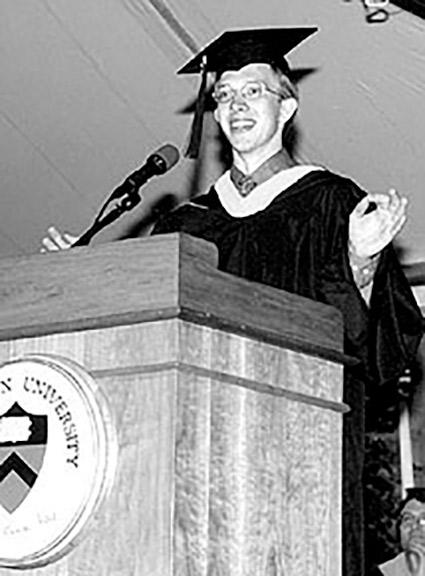
In his valedictory address to his Princeton classmates in May 2000, Houck pointed out the ancient elm behind Stanhope Hall and cited an aphorism about elders planting trees in whose shade they will never sit. He asked the class to think about what trees they were planting that will provide shade in a hundred years and how were they nurturing the saplings until their roots were deep enough to sustain themselves — just as Princeton had done for them.
Those words resonate in the research that he and fellow Princeton faculty members are engaged in today. “Quantum computing and quantum information is a field that will take years before it becomes truly relevant to most people,” he says. The notion of adopting a long view — making audacious bets — is apt when bringing together faculty research in such a transformative field. “We are in the process of building an institute on campus that will do great things as soon as it opens, but the University doesn’t do projects like this on a five- or 10-year timescale,” Houck says. “This institute is going to have an impact for a hundred years.”
When the trustees announced the plan to build an institute for quantum science and engineering, they noted that fields such as quantum science played to Princeton’s strengths at the intersection of the applied and natural sciences. “We are making a big bet by attempting something that seems impossible,” Houck says. “I’m confident we’ll be successful in not only building quantum technology but also in impacting countless other fields in ways that we don’t even know about yet.”
Given the recent breakthroughs made by Princeton researchers both in quantum entangling individual molecules for the first time and in encoding particles within new quantum materials, the preparations underway for a new facility couldn’t come fast enough. Big tech companies and foreign governments are racing to build the first quantum computer due to quantum computers’ potential to both secure and crack encrypted communications. “By their nature, quantum mechanics will enable new kinds of communications that are physically secure against eavesdropping,” Houck says. According to a McKinsey report, quantum start-ups focused on computing, communications and sensing received $2.35 billion in 2022 and the International Data Corporation projects the global quantum computing industry to grow from $412 million in 2020 to $8.6 billion in 2027.
Accelerators also include the U.S. Department of Energy’s National Quantum Initiative, of which Princeton is involved with Co-Design Center for Quantum Advantage (C2QA), and the Princeton Plasma Physics Lab, which provides a place to host experiments and develop new quantum devices. Houck has been the director of C2QA since 2020.
The Quantum Initiative is developing collaborative partnerships with major technology companies, startups and smaller companies in quantum space to both showcase the work the University is doing and introduce students to new developments.
“Our mission is fundamentally different than companies like IBM. Academic labs like ours are where you can attempt the high-risk things that will change the trajectory of what’s possible to achieve,” Houck says. “So, we want to hear about the challenges these companies are facing so we can work on creative ways to address the impediments in the way of achieving useful quantum technologies.”
Expanding the time horizon
Houck is quick to admit that building a quantum computer is incredibly difficult, and his lab faces failure on a regular basis. “We build our devices similar to how you would make a computer chip, but we have to worry incessantly about the many weird things that might disrupt the incredibly weak signals we’re trying to preserve.”
For example, to reduce thermal noise, they isolate their devices inside dilution refrigerators that cool them to one-100th of a degree above absolute zero. “Then we use microwave signals to program them, assemble them into complex quantum states or interrogate what’s happening,” he says.
When the devices don’t function properly because the particles inside weren’t sufficiently shielded from stray electrons and magnetic fields — which happens a lot — or a host of other possible reasons, that’s just the nature of research. “You spend almost all your time searching for an answer and feeling like you’re stuck,” Houck says. “I encourage my students to realize that failure is just the normal state because we’re trying to do things that no one has ever done before.”
Houck’s dedication to his students has made him a popular teacher and advisor, as evidenced by the 2013 President’s Award for Distinguished Teaching from the University and the 2021 Excellence in Teaching Award from the School of Engineering and Applied Science tucked on a shelf in the corner of his office.
“Different courses bring different challenges, but I’ve always loved what I do,” he says. “In the fall I taught the Robotics in Autonomous Systems course, which I love because it’s all working with students one-on-one to solve problems. Before that, I spent a lot of time teaching the first-year math and physics sequence of courses for engineers.”
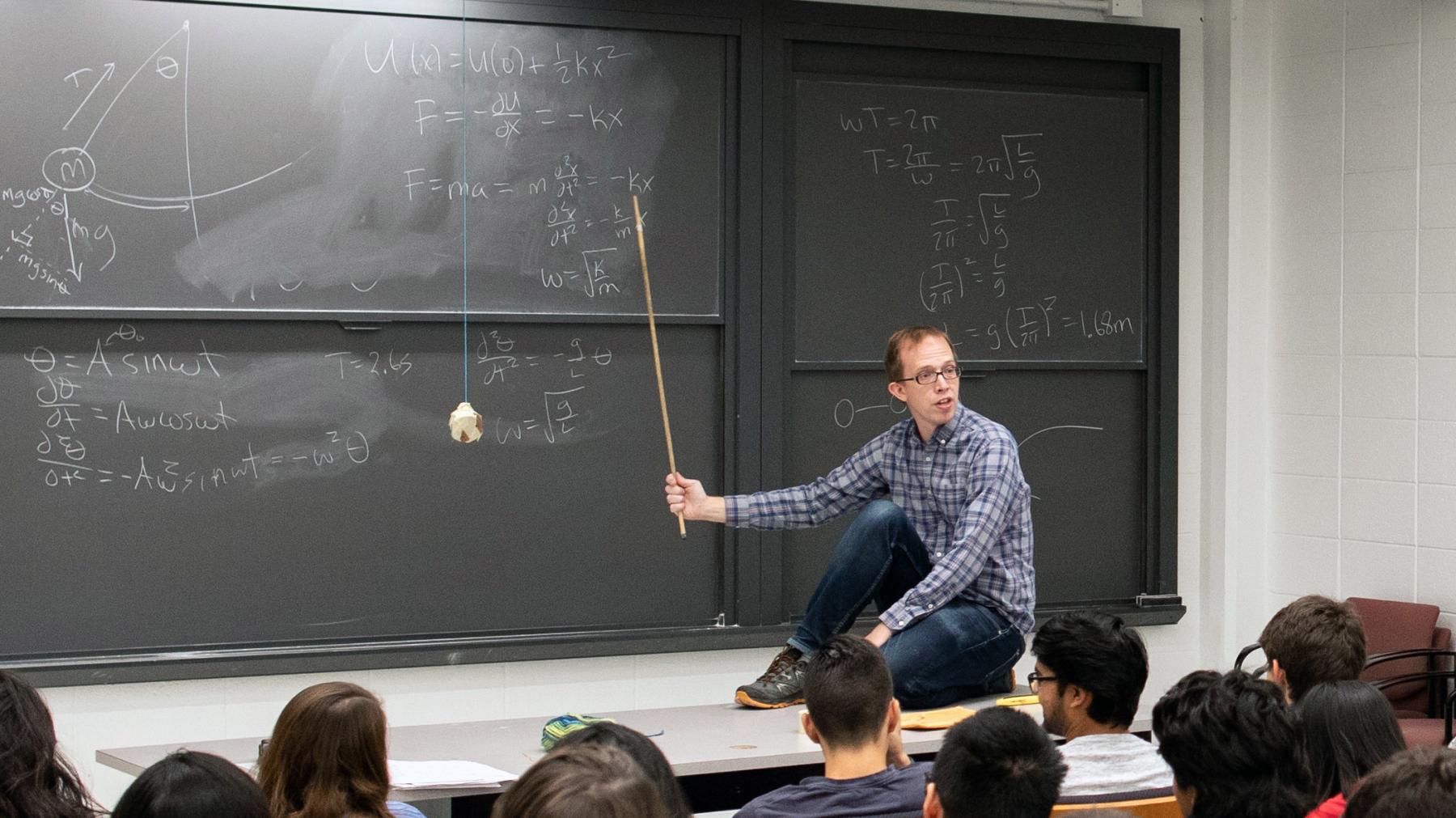
Houck was part of the faculty team that restructured the first-year engineering curriculum to increase interest among students in engineering majors: “I like teaching students in the fall of their first year because I can help ease them through their self-doubt.”
“When you’re a student, you tend to ride your successes on a day-to-day, hour-to-hour basis,” Houck adds. “As they spend a longer time doing science, they see things fail then succeed and learn to take a longer view of their progress.”
Expanding the time horizon, he says, helps students feel less frustrated in the face of failure and tamps down their euphoria when everything works. “My nerdy engineering term for this is learning to low-pass filter your emotions.”
Meeting the moment
What does success in quantum science and engineering look like? Pausing before answering, Andrew Houck looks around his office and says, “We’ll be successful when we build quantum computers, sensors and communication systems that are capable of doing things that aren’t possible any other way — things that everyone had given up on as unsolvable challenges.”
New sensors that are being developed to decode quantum mechanical states are extremely effective at measuring things at smaller resolution, with higher degrees of sensitivity and greater accuracy than existing systems, he says. Among countless other applications, quantum computers could help design catalysts for chemical reactions and enable new levels of data security and secure communications.
“We don’t know everything that can be done with these machines and so, we are attempting something that is unfathomably difficult and absurd,” Houck says. Princeton can realize the potential for quantum, he believes, because it has the faculty and resources to dedicate to the effort for the long term. “We have people here who like to think about the new materials or material properties that are useful for quantum; people who can turn those materials into useful devices; people who can take those devices and build them into systems; and people who can take those systems and do interesting things with them.”
“Success will come when all this effort leads to new ways of thinking about the universe,” he says. “That’s not asking for much, is it?”
